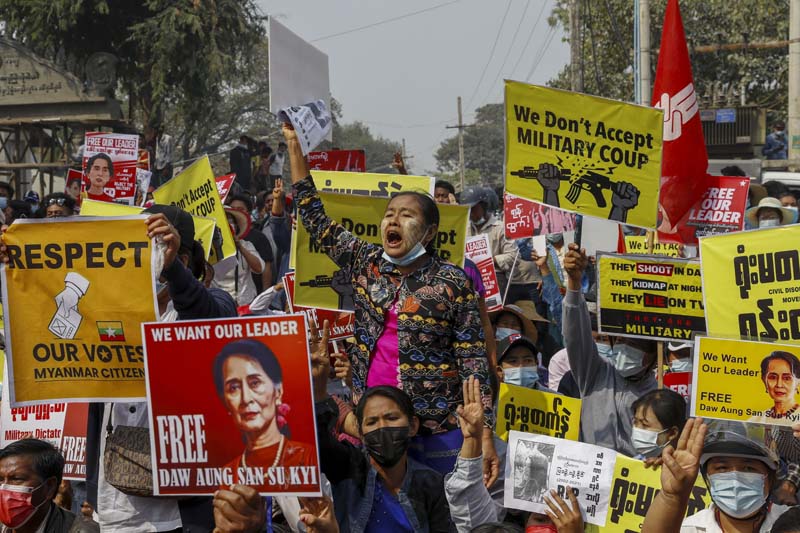

Demonstrators against Myanmar’s military takeover returned to the streets Thursday after a night of armed intimidation by security forces in the country’s second biggest city.
The police rampage in a Mandalay neighborhood where state railway workers are housed showed the conflict between protesters and the new military government is increasingly focused on the businesses and government institutions that sustain the economy.
State railway workers on Sunday had called a strike, joining a loosely organised Civil Disobedience Movement that was initiated by medical workers and is the backbone of the resistance to the February 1 coup that ousted the elected civilian government.
“Many workers and citizens of Myanmar believe that CDM is very effective for making the junta fail,” said a labour activist who spoke on condition of anonymity for his own safety. “That’s why health, education, transportation, different government departments and banks’ employees are participating in CDM together.”
The railway strike has received support from ordinary citizens who have placed themselves on railroad tracks to stop trains the military has commandeered.
The efforts by Mandalay residents to block a rail line on Wednesday apparently triggered the retaliation that night.
Less than an hour after the 8 pm start of the nightly curfew, gunshots were heard as more than two dozen men in police uniforms, shields and helmets, marched in tight formation by the railway workers’ housing. Numerous videos posted on social media showed muzzle flashes as shots were heard, and some were shown shooting slingshots and throwing rocks at buildings. Cadence calls of ‘left, right, left, right’ can be heard along with shouts of ‘shoot, shoot’.
Several reports included photos of people with small wounds, which were claimed to have been caused by rubber bullets. Some unconfirmed reports said several railway workers were arrested.
The junta has said it took over — preventing Parliament from convening and detaining the nation’s elected leader Aung San Suu Kyi and others — because the November election was tainted by voting irregularities. It replaced the election commission that affirmed Suu Kyi’s party won by a landslide and says it will hold a new election in a year’s time.
The Biden government has imposed new US sanctions on Myanmar because of the coup, and the United Nations and other nation’s governments have called for Suu Kyi’s elected government to be restored.
Opponents of the coup are also urging foreign businesses to cut their ties to Myanmar operations they believe benefit the military.
About 200 people demonstrated Thursday near Kanbauk, in the south of the country, outside premises involved in a major pipeline operation that pumps gas from offshore fields for export. The demonstrators moved between the premises of Total of France, PTTEP of Thailand and Petronas of Malaysia and later joined with a larger anti-coup demonstration in Kanbauk.
Extracting industries, such as gas and oil drilling and jade mining, are key sources of foreign revenue for Myanmar. Rights campaigners have appealed to foreign companies involved in those industries to stop paying revenue to the new military government.
The Myanmar Alliance for Transparency and Accountability said any payments would undermine the Myanmar people’s efforts to return the country to democracy” and instead would give the military the resources to violate human rights. The alliance urged companies to release revenue payments only to the democratically elected government.
Street protests continued in other cities. In Yangon, some tried to hinder security forces by abandoning cars in streets. But small groups of men, including several dressed in Buddhist monks’ robes, attacked several drivers and their vehicles, smashing windshields in some cases.
The courts are becoming another battleground.
State television announced charges Wednesday against several prominent entertainers, including actors and directors, who have all been publicly supportive of the protests. They were charged under a law that penalises those who act in a manner intended to hinder or prevent members of the military and government employees from carrying out their duties.
The entertainers were apparently accused of inducing civil servants to walk off the job — and the move reflects the junta’s concern about the widespread and increasing involvement of civil servants in the protests.
On Wednesday night, the military for a fourth day in a row ordered an internet blackout — almost entirely blocking online access from 1 am to 9 am.
While the military did not say why the internet was being blocked, there is widespread speculation that the government is installing a firewall system to allow it to monitor or block online activity.